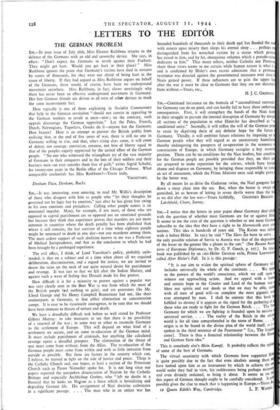Snt,—I notice that the letters in your paper about Germany
deal chi with the question of whether most Germans are for or against Hi It seems to me the crux of the question is whether or not most Ge subscribe to the idea that they have a right to be Herrenvolk over o nations. This idea is hundreds of years old. The Kaiser was imb with it before Hitler. In 1913 he said "The Slays l're born to serve .. the only possible relation of Servia to Austria was that of the depend of the lesser on the greater like a planet to the sun." (See Recent Ret lions of European Diplomacy, by Dr. G. P. Gooch, p. 507.). In 1934 book was published by an nti-Hitler German exile, Prince Loewen called After Hitler's Fall. In it is this passake: "It is our aim to widen the spiritual sphere of Germany tin includes universally the whole of the continent. . . . We aP to the powers of the world's conscience, which we call upon witness our approaching action. And we appeal with a ha and certain hope to the Creator and Lord of the human race bless our spirits and our deeds so that we may be able, ung with all men of good will—to complete the most gigantic w ever attempted by man. I shall be content that this book fulfilled its destiny if it appears as the signal for the gathering of those who are ready to fight for the German Reich. .. . The Germany for which we are fighting is founded upon its mission universal service. . . . The reality of the Reich in the atic world is for all time comprehended in the name of Rome. . 1 origin is to be found in the divine plan of the world itself, as it spoken in the third sentence of the Paternoster" [i.e., Thy king come]. There is thus a fraternal relationship between the R and Qerman State idea."
This is somebody else's Mein Kampf. It probably reflects the op of some of the best of Germans.
The virtual unanimity with which Germans have supported a is quite possibly due to the fact that even idealists among them la have looked upon him as an instrument by which to achieve the I/ world order they had in view, his ruthlessness being perhaps neceso. and even divinely ordained, to bring it about. It seems to me this aspect of German thought ought to be carefully considered. It possibly gives the clue to much that is happening in Europe.—Yours, 12 Queen Edith's Way, Cambridge. L. F. W ARO'


























 Previous page
Previous page